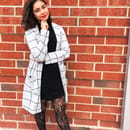George Mason Hillel hosted “Expressions of the Holocaust” partnered with The Jewish Federation of Greater Washington and the JCRC of Greater Washington. It was an event to honor the International Day of Holocaust Commemoration on January 28th. The event consisted of two parts, a general plenary where movies and clips from a once Nazi-occupied Germany were shown, then Holocaust survivor testimonies. I was lucky enough to have the chance to listen to one of those survivors.
The idea behind “Expressions of the Holocaust” was so we, as a Mason community, could remember the tragic things that millions of people went through because of the actions of one man, and his hateful ideas.
Ruth Kohn, a holocaust survivor came to Mason to share her story. Kohn, born in a small town in 1927 Germany, moved to Berlin on the last train for Jews in 1941. There, she went to school but was kicked out two years later for being Jewish.
“I was never a child.” Kohn said with a solemn voice. She spent her entire childhood not knowing if she was going to survive the day. She walked down the street thinking that everyone she passed by was going to shoot her. Kohn was identified as one thing and one thing only: Jewish. She was not an individual. She was not “Ruth” during those years. She was a group of people.Via Pixabay
She continued telling her story, “I couldn’t tell you everything because I would be here until tomorrow.” We tend to think of history as one period that happened between X year and Y year. We tend to forget that there are people who lived through these times day to day.
Kohn talked about her experience of Hitler’s reign and how even “after 80 years, I can still hear his voice in my ears.” She described his voice and way of talking, “he talked for hours and screamed.”
One of the biggest struggles her family faced was finding food. Her father had to trade in anything they had, silverware, furniture… for pork meat, even though pork is not kosher. Her father described the experience as “eating poison” but he was not going to let his children starve. So they ate pork and potato skins and to this day, Kohn cannot stand the taste of potato skins. There are endless triggers that remind her of her trauma and the horrible experiences she went through as a child. She said that she envies people like us, college kids who had childhoods, who got to be teenagers, who did not have to worry about being sent to concentration camps.
Buildings and stores that were owned by Jewish people were burned down and destroyed, she continued on as she described Berlin during the war. Even the biggest synagogue in the city was in flames.Via The United States Holocaust Memorial Museum
On September 1,1939, WWII officially began. Kohn and her family had to move to an air raid shelter every night that was specifically for Jews. She said that two air raids happened every night. One at midnight by the British, and one at 3 in the morning by the Russians. She also mentioned the United States’ unwillingness to let in Jewish refugees into the country saying “we do not have enough space” which was troubling because every opportunity to escape the living hell of Germany was slowly being shut in her face.
Kohn also shared another story during that time, the one of many moments she thought she was going to die. Her family moved to a one room apartment and they were only allowed one room for four people. One morning, two policemen barged into her room.
“They just stood at the door like statues”, she said. They did not ask questions and did not take anything. To this day Kohn still does not know what these policemen wanted. However, she is thankful they did not see the radio on top of the shelf or else her entire family would have been shot. “I think God was with us”, Kohn said.
Kohn ended her story by recounting her escape from Berlin:
Her uncle, who was in a concentration camp at the time, pledged all his money to escape to Belgium. He was then arrested in Belgium and moved to another concentration camp. Once again, he escaped, this time to Portugal. While in Portugal, he received a letter from the Dominican Republic, stating that he and his family can escape to the Dominican Republic, but they would have to own a farm. Her uncle did not know where the Dominican was, but he said, “If it was on the moon I’d go to it.”
On October 14, 1941, “the last day to leave Germany”, she said, was when they took a boat to the Dominican Republic. Young Ruth and her family had finally escaped the horrors of Nazi Germany.Via sosuamuseum.org
In the Dominican, Kohn learned Spanish and got a job at a mental health clinic where she worked with PTSD patients, she then became a nurse, got married and started a family.
Today she is traumatized. There are things that still remind her of Berlin. Yellow benches remind her of the benches that were made specifically for the Jews. Potato peels remind her of the only food that was available to them. She escaped and the war ended, but her personal war never stopped.
She now works for the Holocaust Museum and also shares her story with different schools in association with The Jewish Federation of Greater Washington.
When I talked to her after the event, she told me one thing that stuck with me. I thanked her for sharing her story and she said “don’t forget it”.
People like Ruth Kohn are reminders of why community events like “Expressions of the Holocaust” are important, to remind us of the terrible things that humans are capable of and why we must never let them happen again.



